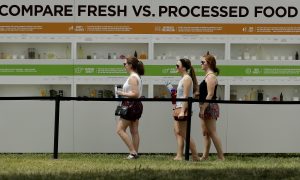Big Pharma, Big Food, and the Poisoning of America
Commentary The always-colorful Russell Brand recently interviewed a man by the name of Calley Means, the founder of TrueMed, a company that promotes the importance of healthy eating and exercise. During the fascinating interview, Mr. Means made a rather startling comment: Processed food companies “contribute 11 times more money to nutritional research in the U.S. than the NIH.” This is astonishing. As I show in this piece, the link between junk food and junk science is both incredibly strong and incredibly dangerous. Marion Nestle, a renowned molecular biologist, told me that the food industry actually sponsors about 15 percent of published research. “Big Food,” she said, “works just like Big Pharma in following the tobacco industry playbook in protecting sales and profits.” The influence of Big Food on Big Science goes back many decades. In the 1960s, the sugar industry paid scientists to blame saturated fat for the increase in heart disease. We now know that saturated fats are nowhere near as bad as previously believed; on the other hand, a diet high in sugar is intimately associated with heart disease. To be more specific, a diet high in added sugar is the real danger. Contrary to popular belief, even leafy green vegetables like spinach, kale, and watercress have a little sugar. Natural sugars are necessary; it’s the added sugars that are lethal. That’s bad news for Americans. According to Max Lugavere, one of the most respected health experts in the world, the average American adult now consumes 77 grams of added sugar in a given day; that’s about 20 teaspoons of pure, unadulterated poison. Rather worryingly, studies show a strong association between diets rich in sugar, increasing waistlines, and a decrease in brain volume. Americans, it seems, are not just getting fatter; they’re also getting dumber. If we agree that a country is only as healthy as its people, then the United States’ future looks rather bleak. If you’re in doubt, let me point you in the direction of the country’s children. Nearly 20 percent of adolescents in the United States are living with prediabetes, a condition that increases their risk of developing cancer, type 2 diabetes, kidney disease, heart disease, and stroke. These children are also at risk of developing Alzheimer’s disease, the most common form of dementia that is sometimes referred to as type 3 diabetes. Reputable researchers argue that Alzheimer’s is a metabolic disease. The consumption of added sugar fuels this disease. Interestingly, cancer, kidney disease, heart disease, strokes, and obesity are all tied to metabolic dysregulation. (Justin Sullivan/Getty Images) The root cause of this dysregulation? Food. Don’t expect the mainstream media to report this, though. For years, we have been fed lies by prominent, mainstream media outlets. Take the pernicious idea that the consumption of chocolate on a regular basis can help you lose weight, for example. Let’s be clear: An occasional piece of chocolate, be it milk chocolate or dark chocolate, is not going to ruin your health. However, the idea that regular chocolate consumption is compatible with a healthy lifestyle is simply false. The same goes for red wine, an alcoholic beverage that is still being marketed as some sort of miracle supplement, an elixir capable of transforming your life for the better. The proliferation of junk science and junk reporting has resulted in a nation of junk food junkies, many of whom are waddling their way to an early grave. By 2030, one in two Americans will be obese. Think about that for a second: Half the country won’t just be fat, they will be extremely fat. Obese individuals tend to live considerably shorter lives than healthier individuals, and these shorter-lived lives tend to be full of joint pain and breathing difficulties. Don’t worry, though, Big Pharma has the solution for the obesity crisis. It’s called Ozempic, a supposed miracle drug designed to help people lose weight. However, as Dr. Peter Attia has warned, “Not all weight loss is healthy.” Shedding excess fat mass is certainly a positive, but “shedding lean mass—which includes muscle and bone—is associated with poorer health trajectories and reduced lifespan.” Ozempic, a once-weekly injectable medication, appears to result in the shedding of lean mass, according to the respected medical professional. Moreover, this is an injection that needs to be taken for the entirety of one’s life. If an individual stops taking the medication, there is a very high chance that they will put all the weight back on. Big Pharma is not in the business of creating cures; it’s in the business of creating customers for life. During a recent debate over Ozempic, the aforementioned Means, who I reached out to before writing this piece, clashed heads with a Harvard doctor by the name of Dr. Chika Anekwe. The academic argued that American taxpayers should subsidize lifetime obesity injections for teens. Obesity, she argued, is a geneti

Commentary
The always-colorful Russell Brand recently interviewed a man by the name of Calley Means, the founder of TrueMed, a company that promotes the importance of healthy eating and exercise. During the fascinating interview, Mr. Means made a rather startling comment: Processed food companies “contribute 11 times more money to nutritional research in the U.S. than the NIH.” This is astonishing. As I show in this piece, the link between junk food and junk science is both incredibly strong and incredibly dangerous.
Marion Nestle, a renowned molecular biologist, told me that the food industry actually sponsors about 15 percent of published research. “Big Food,” she said, “works just like Big Pharma in following the tobacco industry playbook in protecting sales and profits.”
The influence of Big Food on Big Science goes back many decades. In the 1960s, the sugar industry paid scientists to blame saturated fat for the increase in heart disease. We now know that saturated fats are nowhere near as bad as previously believed; on the other hand, a diet high in sugar is intimately associated with heart disease. To be more specific, a diet high in added sugar is the real danger. Contrary to popular belief, even leafy green vegetables like spinach, kale, and watercress have a little sugar. Natural sugars are necessary; it’s the added sugars that are lethal. That’s bad news for Americans.
According to Max Lugavere, one of the most respected health experts in the world, the average American adult now consumes 77 grams of added sugar in a given day; that’s about 20 teaspoons of pure, unadulterated poison. Rather worryingly, studies show a strong association between diets rich in sugar, increasing waistlines, and a decrease in brain volume. Americans, it seems, are not just getting fatter; they’re also getting dumber. If we agree that a country is only as healthy as its people, then the United States’ future looks rather bleak.
If you’re in doubt, let me point you in the direction of the country’s children. Nearly 20 percent of adolescents in the United States are living with prediabetes, a condition that increases their risk of developing cancer, type 2 diabetes, kidney disease, heart disease, and stroke. These children are also at risk of developing Alzheimer’s disease, the most common form of dementia that is sometimes referred to as type 3 diabetes. Reputable researchers argue that Alzheimer’s is a metabolic disease. The consumption of added sugar fuels this disease. Interestingly, cancer, kidney disease, heart disease, strokes, and obesity are all tied to metabolic dysregulation.

The root cause of this dysregulation? Food.
Don’t expect the mainstream media to report this, though. For years, we have been fed lies by prominent, mainstream media outlets. Take the pernicious idea that the consumption of chocolate on a regular basis can help you lose weight, for example. Let’s be clear: An occasional piece of chocolate, be it milk chocolate or dark chocolate, is not going to ruin your health. However, the idea that regular chocolate consumption is compatible with a healthy lifestyle is simply false. The same goes for red wine, an alcoholic beverage that is still being marketed as some sort of miracle supplement, an elixir capable of transforming your life for the better.
The proliferation of junk science and junk reporting has resulted in a nation of junk food junkies, many of whom are waddling their way to an early grave. By 2030, one in two Americans will be obese. Think about that for a second: Half the country won’t just be fat, they will be extremely fat. Obese individuals tend to live considerably shorter lives than healthier individuals, and these shorter-lived lives tend to be full of joint pain and breathing difficulties.
Don’t worry, though, Big Pharma has the solution for the obesity crisis. It’s called Ozempic, a supposed miracle drug designed to help people lose weight. However, as Dr. Peter Attia has warned, “Not all weight loss is healthy.” Shedding excess fat mass is certainly a positive, but “shedding lean mass—which includes muscle and bone—is associated with poorer health trajectories and reduced lifespan.” Ozempic, a once-weekly injectable medication, appears to result in the shedding of lean mass, according to the respected medical professional. Moreover, this is an injection that needs to be taken for the entirety of one’s life. If an individual stops taking the medication, there is a very high chance that they will put all the weight back on.
Big Pharma is not in the business of creating cures; it’s in the business of creating customers for life.
During a recent debate over Ozempic, the aforementioned Means, who I reached out to before writing this piece, clashed heads with a Harvard doctor by the name of Dr. Chika Anekwe. The academic argued that American taxpayers should subsidize lifetime obesity injections for teens. Obesity, she argued, is a genetic issue; it is not tied to the food we consume. Although some people have a genetic predisposition to obesity, to argue that food has no role in the obesity crisis plaguing the country is entirely disingenuous.

Sadly, Dr. Anekwe’s claims shouldn’t surprise us. As Means noted during his interview with Brand, educational institutes have been corrupted by Big Pharma, Harvard included. Big Pharma’s role in U.S. medical education is indisputable. As Dr. Priscilla Vu and Dr. Rijul Kshirsagar previously noted, upon entering medical school, “students are subjected to a barrage of advertising that inevitably leads to a physician-industry connection that can be harmful to our health care system.” It is not uncommon, they say, for students to receive “free meals, textbooks, pocket texts, small trinkets, and even drug samples.”
Rather astonishingly, according to the doctors, anywhere from 40 to 100 percent of medical students “report exposure to the pharmaceutical industry, with clinical students being more likely than preclinical students to report exposure.” Many physicians meet with pharmaceutical representatives on a weekly basis. “Though these examples may seem shocking,” they write, “they underscore the inherently intertwined physician-pharmaceutical relationship.”
By wresting control over medical schools, Big Pharma now plays a leading role in educating the country’s doctors. This is why we have a culture of pill prescriptions, not lifestyle prescriptions.
What, if anything, can be done to stop the Big Pharma machine?
Mark Bittman, an esteemed food journalist, told me that the answer lies “not in making drugs, but in changing agriculture, to grow real food for real people.” He’s right. Sadly, though, the United States now accounts for close to half of the global pharmaceutical market. Today, the global pharma industry is worth $373 billion; by 2030, it’s expected to be worth about $856 billion. Unless a miracle occurs, we should expect more doctors to become glorified drug pushers and more American citizens to become ill.
Views expressed in this article are the opinions of the author and do not necessarily reflect the views of The Epoch Times. Epoch Health welcomes professional discussion and friendly debate. To submit an opinion piece, please follow these guidelines and submit through our form here.












